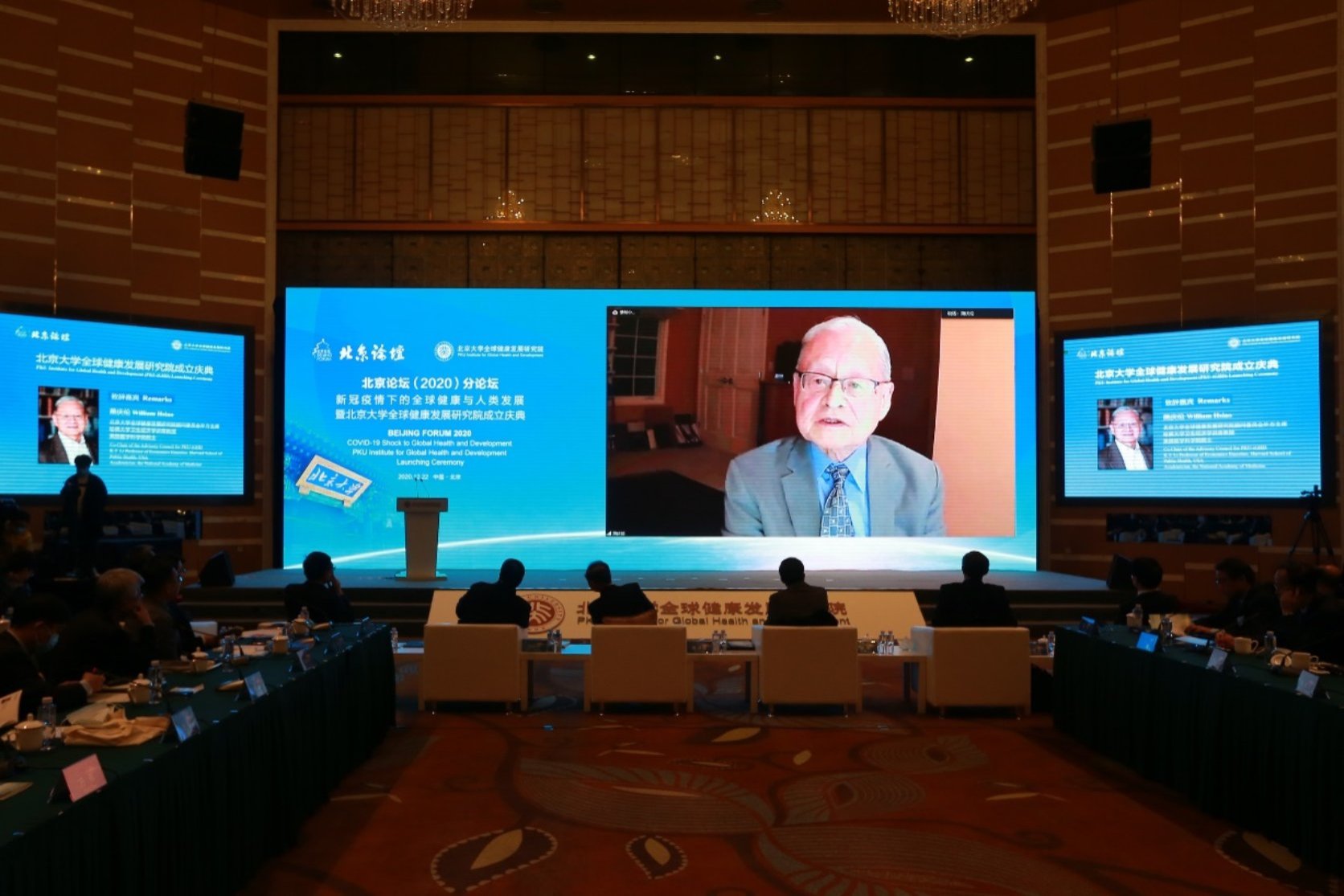
WILLIAM HSIAO Co-Chairman of Advisory Council of PKU-iGHD, Spoke at the launching ceremony of Institute for Global Health and Development, Peking University (PKU-iGHD) and the Beijing Forum 2020: COVID-19 Shocks to Global Health and Development:
Distinguished guests, it is my privilege to participate in this inauguration conference. My address briefly covers two topics. First, what COVID-19 pandemic has taught us. Second, what are some of the important missions for Peking University Institute for Global Health and Development.
The pandemic has produced devastating impacts on humanity’s health, every nation’s economy and deepened poverty to other world. World Health Organization reported today, more than 75 million people already infected and 1.7 million people have died from COVID-19. In economic impact, the European Union economy alone has declined by 8% this year.
For the future, the pandemic will change how we live, work, and shop. What has the pandemic taught us that it reminded us that communicable diseases have no respect whatsoever for national boundaries. The evidence over the past few decades informed us that on average we can expect every three years or so there will be a new deadly viral infectious disease that emerges.
COVID-19 also tested international cooperation. It revealed the fragmentation and the fragility of international cooperation. At the same time, the pandemic teaches us that we have to have solidarity among nations to end this global crisis. I congratulate Peking University for establishing the institute of global health and development to realize our common vision. PKU has widely selected to principal areas of global concern for the Institute to focus on: health and development.
May I highlight a critical precondition for international cooperation. It builds out of trust among nations. To establish trust among nations requires us to respect each other's culture, ethnicity, and religion. Recent history has keenly taught us that the history, culture, and social values of Western nations are different from those of East Asia, South Asia, Middle East, and Africa. Therefore, in my view, Western nations cannot continue to set the conditions and rules for international cooperation. A new set of rules must be agreed upon by all nations.
In short, international cooperation requires trust and respect among the partners. We cannot simply impose our priorities, values, and ways of doing things on others.
Now let me turn to my second topic: The missions of the Institute. Peking University shows its wisdom as Chairman HAN Qide already said that to establish the institute to be an interdisciplinary organization, the institute will be building on three intellectual pillars: economics, public health, and international relations. Hence, the first challenge for the Institute is how to foster interdisciplinary work. Let me share with you Harvard University's experience. We have been trying to break down the interrelation and isolation of different disciplines and to foster interdisciplinary research for a couple of decades now. We found it is a hard and long road.
Peking University certainly has the intellectual and the technical competency and the money to produce global public goods. Besides working cooperatively with research institutions around the world to discover new science, technology, and new socioeconomic models in global health and development, the Institute can also be a leader in translating knowledge to application. Often knowledge itself may not be directly useful. A good illustration is that we need engineers to translate physics and chemistry sciences into useful applications.
In translating the knowledge for the world, we must recognize nations are at different stages of development. At each stage, nations have different resources, capabilities, and capacities, we know what works in a fluent nation may not work in poor and lower income nations. Moreover, the Institute must master the different institutional studies among nations. China has its own particular institutional structure to achieve its successes. Other nations have different institutional forms. To translate what's useful and applicable, institutional aspects must be considered.
May I point now that this Institute has the unique opportunity to translate China's rich experience in public health, health care systems, and economic development for the world. For example, in the health field, the Chinese historical successes included Barefoot Doctors, malaria eradication and cooperative medical teams.
The more recent ones can be exampled that China achieving universal health coverage. Employing internet medicine for rural residents and its approach to successfully alleviate absolute poverty. Thus, I believe the missions of the Institute is to discover knowledge and translate knowledge into application for global use. Translation requires the Institute to consider nations are In different stages of development and nations have different institutional forms.
In conclusion, pandemic recovery is our chance to re-engineer our global health and economies to plan a social contract among nations for international cooperation. PKU’s Institute could play a major and leading role in this new world. My best wishes for the Institute's success. Thank you.